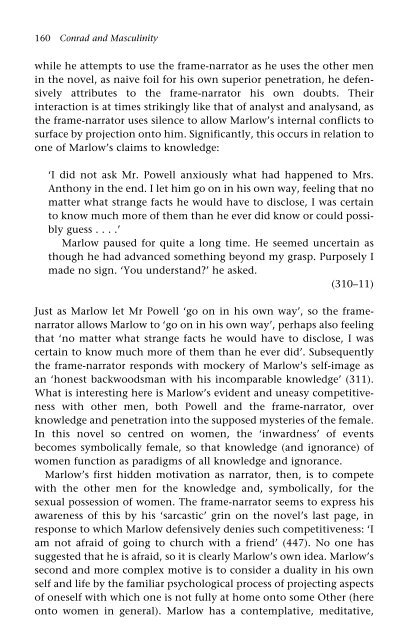Conrad and Masculinity
Conrad and Masculinity
Conrad and Masculinity
Create successful ePaper yourself
Turn your PDF publications into a flip-book with our unique Google optimized e-Paper software.
160 <strong>Conrad</strong> <strong>and</strong> <strong>Masculinity</strong><br />
while he attempts to use the frame-narrator as he uses the other men<br />
in the novel, as naive foil for his own superior penetration, he defensively<br />
attributes to the frame-narrator his own doubts. Their<br />
interaction is at times strikingly like that of analyst <strong>and</strong> analys<strong>and</strong>, as<br />
the frame-narrator uses silence to allow Marlow’s internal conflicts to<br />
surface by projection onto him. Significantly, this occurs in relation to<br />
one of Marlow’s claims to knowledge:<br />
‘I did not ask Mr. Powell anxiously what had happened to Mrs.<br />
Anthony in the end. I let him go on in his own way, feeling that no<br />
matter what strange facts he would have to disclose, I was certain<br />
to know much more of them than he ever did know or could possibly<br />
guess . . . .’<br />
Marlow paused for quite a long time. He seemed uncertain as<br />
though he had advanced something beyond my grasp. Purposely I<br />
made no sign. ‘You underst<strong>and</strong>?’ he asked.<br />
(310–11)<br />
Just as Marlow let Mr Powell ‘go on in his own way’, so the framenarrator<br />
allows Marlow to ‘go on in his own way’, perhaps also feeling<br />
that ‘no matter what strange facts he would have to disclose, I was<br />
certain to know much more of them than he ever did’. Subsequently<br />
the frame-narrator responds with mockery of Marlow’s self-image as<br />
an ‘honest backwoodsman with his incomparable knowledge’ (311).<br />
What is interesting here is Marlow’s evident <strong>and</strong> uneasy competitiveness<br />
with other men, both Powell <strong>and</strong> the frame-narrator, over<br />
knowledge <strong>and</strong> penetration into the supposed mysteries of the female.<br />
In this novel so centred on women, the ‘inwardness’ of events<br />
becomes symbolically female, so that knowledge (<strong>and</strong> ignorance) of<br />
women function as paradigms of all knowledge <strong>and</strong> ignorance.<br />
Marlow’s first hidden motivation as narrator, then, is to compete<br />
with the other men for the knowledge <strong>and</strong>, symbolically, for the<br />
sexual possession of women. The frame-narrator seems to express his<br />
awareness of this by his ‘sarcastic’ grin on the novel’s last page, in<br />
response to which Marlow defensively denies such competitiveness: ‘I<br />
am not afraid of going to church with a friend’ (447). No one has<br />
suggested that he is afraid, so it is clearly Marlow’s own idea. Marlow’s<br />
second <strong>and</strong> more complex motive is to consider a duality in his own<br />
self <strong>and</strong> life by the familiar psychological process of projecting aspects<br />
of oneself with which one is not fully at home onto some Other (here<br />
onto women in general). Marlow has a contemplative, meditative,




